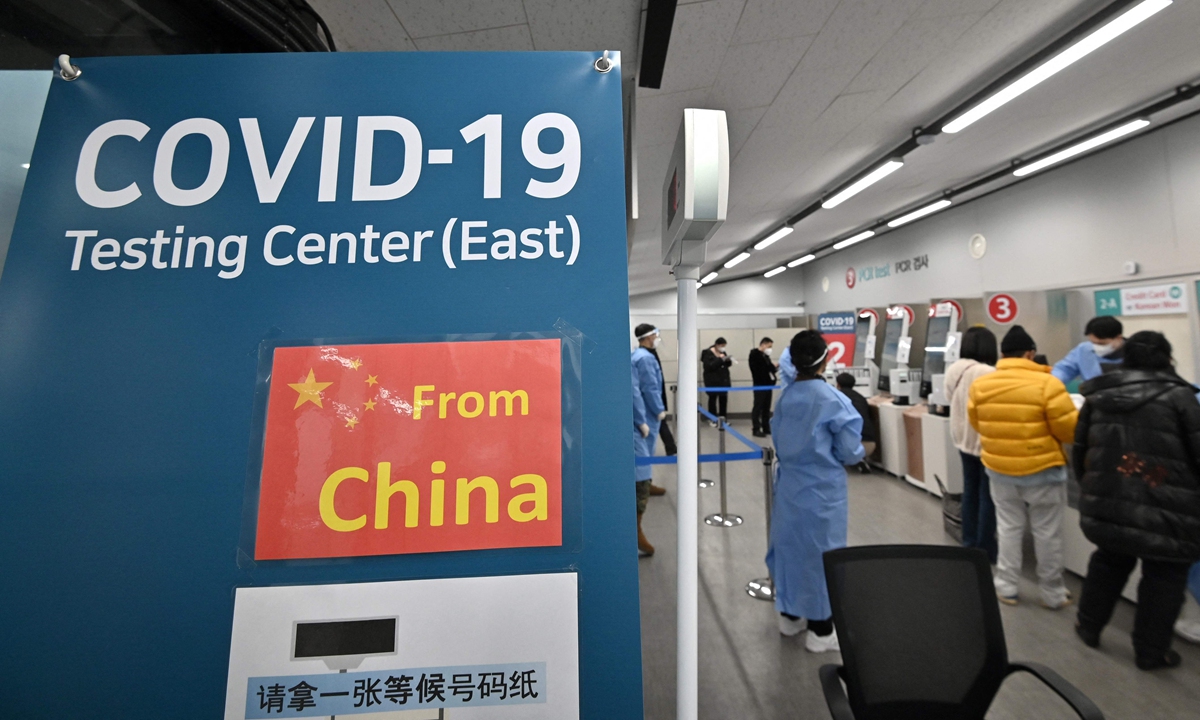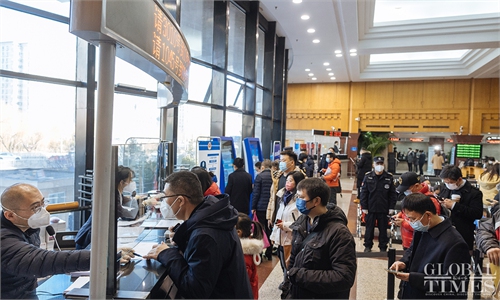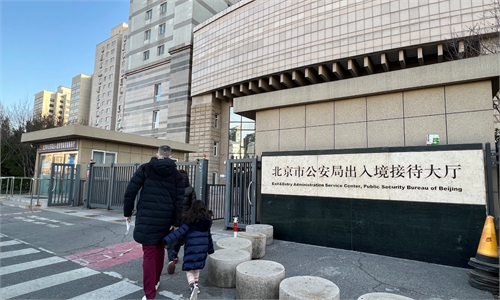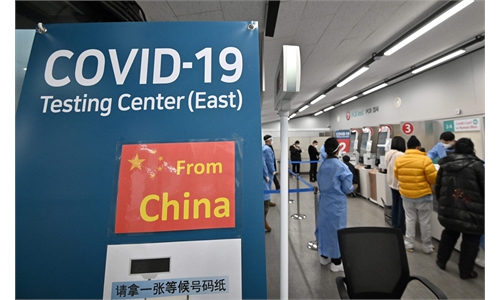China suspends port, transit visa services for S.Korean, Japanese citizens in response to discriminatory entry measures

Health workers guide travelers from China at a COVID-19 testing center at Incheon International Airport in South Korea on January 3. Photo: VCG
A day after China hit back at the discriminatory travel restrictions imposed by several countries on travelers from China, China's National Immigration Administration on Wednesday announced a decision to suspend the issuance of port visas and the 72/144-hour visa-free transit policy for citizens of South Korea and Japan.The Chinese Foreign Ministry reiterated on Wednesday that China's reaction aims to safeguard the legitimate rights and interests of Chinese citizens and protect the necessary environment for normal exchanges.
The action came in response to the discriminatory entry-restriction measures targeting Chinese citizens by a small number of countries, said the National Immigration Administration on Wednesday.
China imposed its first countermeasure on Tuesday toward discriminatory and unnecessary travel restrictions against travelers from China by suspending short-term visas for South Korean citizens who want to visit China.
Following the move by the Chinese Embassy in South Korea, the Chinese Embassy in Japan issued a notice on Tuesday to suspend the issuing of ordinary visas for Japanese citizens who want to travel to China, without notifying a date for resumption.
In response to the matter, which led Japan to lodge a protest to China over the suspension of visas for Japanese citizens, Wang Wenbin, spokesperson of the Chinese Foreign Ministry, said on Wednesday that China's relevant measures are legitimate and reasonable.
A few countries, ignoring the scientific basis and the reality of the epidemic, insist on imposing discriminatory entry restrictions on travelers from China, Wang noted.
"China's reciprocal response in light of the actual situation of discriminatory measures taken against China is not only to safeguard the legitimate rights and interests of its citizens, but also to safeguard normal exchanges and cooperation between countries, which is legitimate and reasonable," he said.
In contrast to a few countries, mainly US allies, more countries take a rational approach in viewing China's epidemic situation, and a number of public health experts have urged countries to view the matter from a scientific and reasonable perspective.
The ongoing COVID-19 epidemic in China is not expected to "significantly impact" the European region, UN health experts said on Tuesday.
Hans Kluge, head of the World Health Organization for Europe, explained that "this is because the two variants circulating in China are already present in European countries," according to data provided by the Chinese authorities.
The European Centre for Disease Prevention and Control (ECDC) and the European Union Aviation Safety Agency jointly provided guidelines for aviation on Wednesday as Europe has agreed on measures to be applied in aviation in response to China's epidemic situation, making recommendations that could potentially be applied in other geographical regions in similar situations.
It recommends pre-departure testing for passengers on direct and indirect flights, wearing of medical face masks, and enhanced cleaning and disinfection of aircraft. It also said random testing may also be carried out on a sample of arriving passengers, according to a statement on the website of the ECDC.
"I think genome sequencing is rational. Instead of aiming to prevent the virus, the measure aims to identify new varieties that may arise," Chen Xi, an assistant professor of public health at Yale University, told the Global Times on Wednesday.
It should conduct representative sampling on planes flying from countries and regions that experience an epidemic peak, he said. Chen earlier suggested that requiring a PCR test for every traveler on arrival is unnecessary as the world is now mainly preventing more virulent and transmissible variants. It's more important to conduct on-site sampling to track variants through genomic sequencing.
However, to enter Japan, travelers from China must present a negative COVID test within 72 hours of departing for Japan as well as undergo a PCR or high-sensitivity antigen test upon entry.
South Korea is currently one of the countries that have taken the strictest discriminatory entry restrictions against China. In recent days, Chinese netizens have repeatedly said that South Korea's anti-epidemic measures against Chinese travelers are "insulting" and that "checks are only targeting Chinese people."
Japan and South Korea took discriminatory measures against Chinese citizens, creating difficulties and obstacles on the people-to-people exchanges, toward which China has the reason to take countermeasure, Chinese Foreign Minister Qin Gang told the media during his visit to Ethiopia on Wednesday.
The travel restriction measures taken by South Korea have caused Chinese tourists to feel dissatisfaction or anger, and China has adopted correct reciprocal countermeasures, which echo the common aspirations of the Chinese people, Lü Chao, an expert on the Korean Peninsula issue at the Liaoning Academy of Social Sciences, told the Global Times on Wednesday.
South Korea's travel restrictions have nothing to do with the epidemic or economic reasons, but are due to "political reasons." "It is South Korea's unilateral attempt to damage its relations with China. Therefore, we must take some countermeasures and express our attitude," Lü said.
South Korea's excessive measures also led to a recent spike in airfares between China and South Korea.
The Global Times learned from relevant authorities that the decision to cancel flights between South Korea and China was made by South Korea after it had placed new restrictions on travelers from China but found it was unable to operate some flights.
There are currently around 60 international passenger flights between China and South Korea each week.
The decline in flight availability and sudden increase in demand have been cited as the reasons for the recent spike in airfares.
Some people in South Korea, including those involved in trading businesses, were very happy to welcome China's optimized pandemic policies. However, the South Korean government's move has disappointed its citizens as well, especially as they need to face rising airfares to travel to China, Lü noted.
"The South Korean authorities' move is to follow the US, but the impact and losses to South Korea in this respect will be greater," he said.



